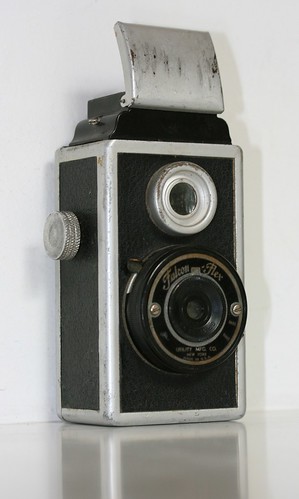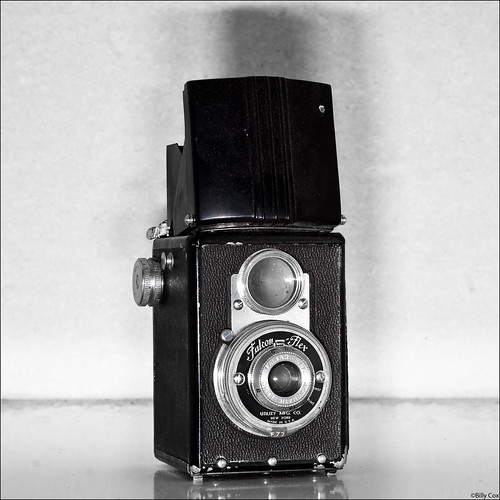Difference between revisions of "Falcon Flex"
(→Notes) |
(→Notes) |
||
| Line 36: | Line 36: | ||
[[Category: F]] | [[Category: F]] | ||
[[Category: 127 film]] | [[Category: 127 film]] | ||
| − | The Falcon Flex 6x6 model was manufactured in 1939. It was made in New York, New York by the Utility Mfg. Company which may have been located at West 25th Street. The Falcon Flex is made of cast aluminum and has a bakelite hood. The camera features a focusing taking lens marked at 6ft and | + | The Falcon Flex 6x6 model was manufactured in 1939. It was made in New York, New York by the Utility Mfg. Company which may have been located at West 25th Street. The Falcon Flex is made of cast aluminum and has a bakelite hood. The camera features a focusing taking lens marked at 6ft and infinity. It has a single speed shutter with B setting, adjustable aperture with settings for f-11 and f-16, and a Faltar Precise 82mm lens. It is covered in black fine grain leatherette which is embossed with lines along its borders. The earlier model of this camera has three red windows on the back panel in a row down the left side, while the later variant had one red window in the center of the back panel. Both models took 120 film, and may have been some of the first American made twin lens cameras. |
| + | |||
| + | For the collector the Falcon Flex 6x6 is a somewhat scarce camera and even more difficult to find one in good condition. Many examples are plagued by rust, grime, missing or damaged leatherette, dirty or dim viewfinder, and paint loss especially on the metal pop-up finder back. It was a well made camera though, which is quite surprising for an American pseudo twin lens reflex camera. Since this camera takes readily available 120 film, it can still be used provided the example is at least in working condition with a clean lens. | ||
Revision as of 19:08, 28 December 2012
The Falcon Flex 3x4 was a 127 film pseudo TLR made by the Utility Manufacturing Company in New York. The body was cast in aluminium[1].

|
| Falcon Flex image by Graustark (Image rights) |

|
| Falcon Flex image by Graustark (Image rights) |
The Falcon Flex 6x6 was a 120 film version, c.1939.

|
| 6×6 Falcon Flex image by Billy Cox (Image rights) |
Notes
- ↑ McKeown, James M. and Joan C. McKeown's Price Guide to Antique and Classic Cameras, 12th Edition, 2005-2006. USA, Centennial Photo Service, 2004. ISBN 0-931838-40-1 (hardcover). ISBN 0-931838-41-X (softcover). Page 943.
The Falcon Flex 6x6 model was manufactured in 1939. It was made in New York, New York by the Utility Mfg. Company which may have been located at West 25th Street. The Falcon Flex is made of cast aluminum and has a bakelite hood. The camera features a focusing taking lens marked at 6ft and infinity. It has a single speed shutter with B setting, adjustable aperture with settings for f-11 and f-16, and a Faltar Precise 82mm lens. It is covered in black fine grain leatherette which is embossed with lines along its borders. The earlier model of this camera has three red windows on the back panel in a row down the left side, while the later variant had one red window in the center of the back panel. Both models took 120 film, and may have been some of the first American made twin lens cameras.
For the collector the Falcon Flex 6x6 is a somewhat scarce camera and even more difficult to find one in good condition. Many examples are plagued by rust, grime, missing or damaged leatherette, dirty or dim viewfinder, and paint loss especially on the metal pop-up finder back. It was a well made camera though, which is quite surprising for an American pseudo twin lens reflex camera. Since this camera takes readily available 120 film, it can still be used provided the example is at least in working condition with a clean lens.